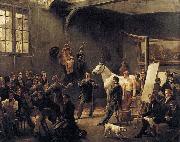Wholesale Oil Painting No Minimum |
|||||||||||
|
|
|||||||||||

|
|||||||||||
|
|
|
||||||||
VERNET, Claude-JosephFrench Painter, 1714-1789 Painter. Vernet probably received his first lessons in painting from his father, Antoine, who then encouraged him to move to the studio of Philippe Sauvan (1697-1792), the leading master in Avignon. Sauvan supplied altarpieces to local churches and decorative works and mythologies for grand houses in the area. After this apprenticeship Vernet worked in Aix-en-Provence with the decorative painter Jacques Viali ( fl 1681- 1745), who also painted landscapes and marine pictures. In 1731 Vernet independently produced a suite of decorative overdoors for the h?tel of the Marquise de Simiane at Aix-en-Provence; at least two of these survive (in situ) and are Vernet's earliest datable landscapes. These are early indications of his favoured type of subject, and Vernet would have studied works attributed to such 17th-century masters as Claude Lorrain, Gaspard Dughet and Salvator Rosa in private collections at Aix and Avignon. Three years later Joseph de Seytres, Marquis de Caumont, who had previously recommended Vernet to the Marquise de Simiane, offered to sponsor a trip to Italy. |
||||||||
|
|
||||||||
The Artist's Studio
The Artist's Studio Painting ID:: 62553 |
52 x 64 cm Private collection The picture shows the artist's as a crowded and social space, where work was more likely to be interrupted by loungers and visitors, fencing matches and dog fights, than by melancholy soul-searching. Yet in fact this is an image of frustration. The fall of Napoleon had left the once-fashionable Vernet bereft of subjects and patrons, and his political views had excluded him from the Paris Salon of 1821. He had been obliged to show in this very studio, including his picture of it as an ironic symbol of the impasse to which he had been brought. Author: VERNET, Horace Title: The Artist's Studio Form: painting , 1801-1850 , French , interior 52 x 64 cm Private collection The picture shows the artist's as a crowded and social space, where work was more likely to be interrupted by loungers and visitors, fencing matches and dog fights, than by melancholy soul-searching. Yet in fact this is an image of frustration. The fall of Napoleon had left the once-fashionable Vernet bereft of subjects and patrons, and his political views had excluded him from the Paris Salon of 1821. He had been obliged to show in this very studio, including his picture of it as an ironic symbol of the impasse to which he had been brought. Author: VERNET, Horace Title: The Artist's Studio Form: painting , 1801-1850 , French , interior |
|||||||
|
|
||||||||
|
Peter Tillemans Flemish Painter, ca.1684-1734 was a Flemish painter, best known for his works on sporting and topographical subjects. Alongside John Wootton and James Seymour, he was one of the founders of the English school of sporting painting. From 1708 until his death he lived and worked in England. Tillemans was born in Antwerp in c. 1684, the son of a diamond-cutter, and studied painting there under various masters. As he was the brother-in-law of another Flemish painter, Pieter Casteels, it is assumed that he married before leaving Antwerp. Like other artists from the Low Countries such as Dirk Maas, Jan Wyck and William van de Velde, Tillemans moved to England. In Tillemans's case he moved in 1708, induced to do so by a picture-dealer called Turner: he spent the rest of his life working there. In his Sportsmen in a Landscape (1971), Aubrey Noakes offers this description of Tillemans: If we may judge from his success Tillemans was a socially agreeable and charming man. A portrait of him reveals that he was a gentle, friendly-looking fellow, with long curling hair, presumably his own and not a wig, such as was commonly worn by members of the upper and professional classes in the late eighteenth century. A chronic sufferer of asthma, Tillemans retired to Richmond "on account of his ill state of health". He died at the house of Dr Cox Macro (1683?C1767, later chaplain to George II) in Little Haugh Hall, in Suffolk, on 5 December 1734 (the previous day he "had been busy on a horse portrait") and was buried on 7 December at Stowlangtoft. His collection of paintings had been sold in an auction conducted by Dr Macro on 19 and 20 April 1733 and included paintings by James Tillemans, probably a son or other relation, The Artist's Studio Date c. 1716(1716) Medium Oil on canvas Dimensions 68.3 x 84 cm (26.9 x 33.1 in) cjr |
||||||||
|
|
||||||||
|
Prev Next
|
||||||||
|
|
||||||||
|
Related Paintings to Peter Tillemans :. |
||||||||
|
|
||||||||
|
CONTACT US |

